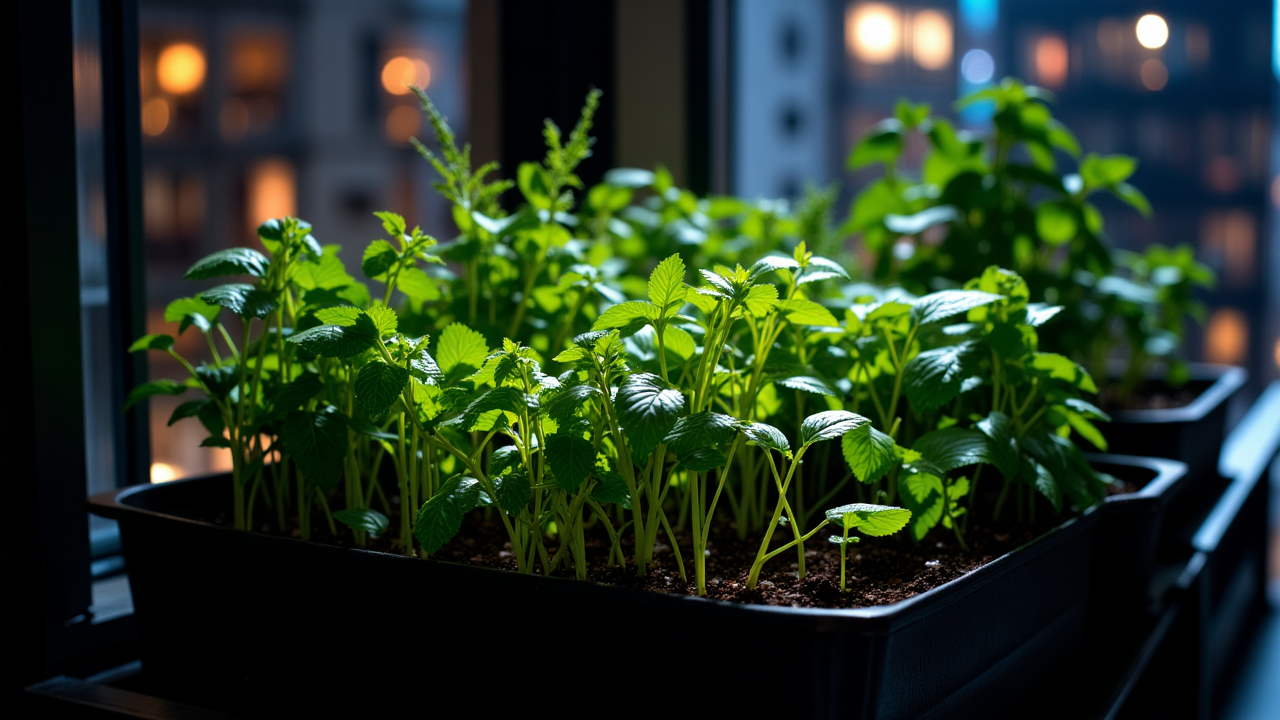Growing a Lush Herb Garden (Even in a High-Rise Apartment)
If you find yourself in a towering high-rise rather than a cozy burrow under the hill, fear not! You can still grow a delightful little herb garden fit for seasoning your stews, garnishing your mushroom toasts, and—most importantly—making your home feel just a bit more magical.
1. Choose Your Herbs Wisely (Not All Green Things Are Created Equal!)
In a grand garden, one might have the luxury of growing vast bushes of rosemary, sprawling thyme, and parsley that spreads like a gossiping neighbor. But in a small space, one must be strategic! The best herbs for apartment gardening are:
- Basil – Loves warmth and sunshine. Will make you feel like a true culinary wizard.
- Thyme – A low-maintenance plant that thrives in small pots and makes everything taste better.
- Chives – Hardy, easy to grow, and perfect for adding a bit of hobbit flair to potatoes.
- Mint – A wonderful plant, but beware! It spreads faster than second breakfast cravings. Keep it in its own pot unless you want a mint invasion.
- Rosemary – A sturdy, drought-tolerant herb that smells divine and keeps your kitchen feeling like an enchanted forest.
- Oregano – Low maintenance and perfect for sprinkling on anything that needs a little extra something.
2. Find the Sunniest Spot (Even If It’s Not a Rolling Green Hill)
Herbs, much like hobbits, love the sun. If you have a south-facing window, that is the prime real estate for your little green darlings. No good windows? No problem! A small grow light can work wonders, turning even the dimmest corners into a thriving little garden.
3. Use the Right Pots (Because Nobody Likes a Soggy Bottom)
Herbs despise wet feet, so make sure to use pots with proper drainage holes. If your chosen container lacks them, either drill a hole (if possible) or line the bottom with pebbles to keep things from getting too swampy. Terra cotta pots are particularly lovely, as they allow for good air circulation—plus, they give your home that classic “cozy gardener” look.
4. Water With Care (Less Is More, My Dear Bagginses!)
Overwatering is the downfall of many a well-intentioned herb grower. Herbs generally prefer to dry out a bit between waterings, so poke your finger into the soil—if it’s still damp, hold off! If it’s dry about an inch down, it’s time to give them a drink. A little misting now and then also helps keep things fresh without drowning them.
5. Feed Them Well (But Not Too Much, Lest They Grow Lazy!)
Just as a hobbit thrives on a steady diet of fresh bread and good cheese, herbs need a little nourishment too. A diluted liquid fertilizer (something mild, like fish emulsion or compost tea) once a month should keep them happy without overwhelming them. Too much fertilizer, and they’ll grow big but lose their flavor—like a wizard with too many spells and not enough wisdom!
6. Snip and Clip Often (Herbs, Like Adventurers, Need Purpose!)
The more you harvest, the better they grow! Regularly trimming your herbs encourages them to become full and bushy rather than leggy and sad. Never take more than a third of the plant at a time, and always cut just above a set of leaves to encourage new growth.
7. Get Creative with Space (Think Like a Hobbit, Stack Like a Dwarf!)
If your apartment is more of a cozy burrow than a grand hall, try vertical gardening. Hanging pots, tiered plant stands, or even a magnetic strip for small containers can turn a tiny space into a flourishing green nook. If you have a balcony, window boxes are a lovely touch—just be sure to secure them well, lest an unexpected gust of wind send your basil on an unscheduled adventure.
8. Keep an Eye Out for Pests (Even a Tiny Garden Has Its Dragons)
Though you may be high above the ground, pests like gnats and aphids can still find their way in. A gentle spritz of soapy water or a few ladybugs (if you can befriend some) will keep most troublemakers at bay. Also, avoid letting water collect in trays, as stagnant water attracts all sorts of unwelcome creatures.
9. Give Your Herbs a Cozy Winter Retreat
If your apartment is prone to drafts, consider moving your herbs away from chilly windows in the winter months. A small heat mat can keep roots warm, and grow lights help if the sun decides to take an extended holiday. Some herbs, like basil, are delicate and may prefer to be regrown from cuttings each year rather than attempting to survive a harsh winter.
10. Enjoy the Fruits (Or Rather, Leaves) of Your Labor!
The best part of growing an herb garden—no matter how small—is that it adds joy to daily life. There’s something magical about snipping fresh basil for a pasta dish, or rubbing a sprig of rosemary between your fingers just for the scent of it. Even if your “garden” is no more than a few pots on a windowsill, it brings a touch of the wild, green world into your home.
And that, my dear friend, is a worthy thing indeed.
So go forth, plant your little high-rise herb patch, and may your basil be ever bountiful, your thyme forever plentiful, and your mint—well, may it not take over your entire kitchen!
